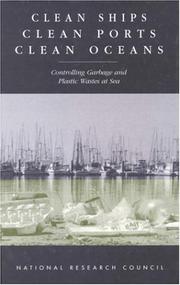| Listing 1 - 3 of 3 |
Sort by
|
Dissertation
Year: 2013 Publisher: Liège Université de Liège (ULiège)
Abstract | Keywords | Export | Availability | Bookmark
 Loading...
Loading...Choose an application
- Reference Manager
- EndNote
- RefWorks (Direct export to RefWorks)
Global environmental agencies and maritime authorities have become increasingly concerned by the environmental impact of CO2 emission. Increasing fleets of super yachts consume ever larger quantities of fossil fuel. Increasing social pressure and new legislative efforts to reduce environmental damage mean that the industry must respond accordingly. Current yacht design legislation has a focus on occupational safety and the environment. However the legislation surrounding environmental protection has been increasing significantly. Environmental legislation addresses both the protection of the environment in the event of an accident and also on reducing the operational environmental impact. EEDI or Energy Efficiency Design Index is a new standard, that was set by the IMO (the International Maritime Organization) for new ships greater than 400 GT with some exceptions that can be allowed by Administrative bodies until 2017 (regulation 19.4). The purpose behind the EEDI is to promote innovation from the initial ship design stage in order to reduce energy consumption at full load. It is applicable to many vessels: bulk carriers, tankers, container ships, general cargo ships, passenger ships, gas carriers, gen eral cargo and RO-RO vessels. Working class vessels such as offshore supply vessels, tugboats and dredgers are excluded for the present time. There are no conformations until this point in time whether EEDI will be implemented on yachts. Azimut-Benetti is taking an early initiative to investigate any possibilities for improvement. In such event this could become a driver for sales. As the EEDI is measurable figure, this could become a way for comparing shipyards, hence increasing competition on this field. At the conclusion of this research, Azimut-Benetti Yachts will be presented with guidelines that will assist in calculating the EEDI and selecting the most efficient technologies that optimise both cost and efficiency. Azimut-Benetti has a keen interest in the cost and potential savings over time from implementing the EEDI compared to existing technologies and offer to owner‟s efficient yachts
Dissertation
Year: 2013 Publisher: Liège Université de Liège (ULiège)
Abstract | Keywords | Export | Availability | Bookmark
 Loading...
Loading...Choose an application
- Reference Manager
- EndNote
- RefWorks (Direct export to RefWorks)
MARPOL Annex VI regulates the emissions from all ships trading internationally. Ship owners must take actions before the lowest limits come into force. The combined challenges of rising oil prices and increasing regulatory stringency on shipping’s air emissions justify the exploration of feasibilities between compliant technologies. This study focuses on the scrubber technology for large marine engines with which ships can continue to use preferable cheap heavy fuel oil (HFO) without exceeding the emission control limits. It draws on existing technical and economical information about scrubber systems in the market to establish a complete life cycle cost analysis for four vessel types: Containership, passenger ship, Ro-Pax and tanker. An investigation of the technology overview, cost data, emission reduction efficiency, impact of installations, operational issues and installation case studies is conducted. Environmental impacts such as wash water discharge, sludge disposal and end-of-life recycling are also addressed. By choosing the marine gas oil (MGO) utilisation as the baseline, the life cycle cost analysis is performed between different types of scrubber system, namely open loop seawater scrubber, closed loop freshwater scrubber, hybrid scrubber and dry scrubber system. The life cycle cost analysis results are presented by the net present value (NPV) and the return of investment (ROI) time. Under the assumption of current HFO and MGO price, a positive NPV can be found for every scrubber types subjected to four vessel types with the ROI time ranging from 1to 5 years depending on the operation profile in ECA-SOx.

ISBN: 0309051371 9786610193509 1280193506 030958728X 0585158711 9780585158716 9780309051378 0309176778 9780309176774 9781280193507 6610193509 Year: 1995 Publisher: Washington, D.C. National Academy Press
Abstract | Keywords | Export | Availability | Bookmark
 Loading...
Loading...Choose an application
- Reference Manager
- EndNote
- RefWorks (Direct export to RefWorks)
SCIENCE --- Earth Sciences / Oceanography --- Marine debris --- Civil & Environmental Engineering --- Engineering & Applied Sciences --- Environmental Engineering --- Management --- -Beach debris --- Debris, Beach --- Debris, Marine --- Marine garbage --- Marine litter --- Marine refuse --- Marine trash --- Ocean trash --- Litter (Trash) --- Marine pollution --- Management. --- -Management --- International Convention for the Prevention of Pollution from Ships --- Beach debris --- 1973-nen no kaiyō osen ni kansuru kokusai kaigi --- MARPOL --- MARPOL Convention --- Mezhdunarodna Konvent︠s︡ii︠a︡ za Predotvrati︠a︡vane na Zamŭrsi︠a︡vaneto ot Korabi (1973) --- International Convention for the prevention of pollution from ships --- Marine debris - Management. --- Mezhdunarodna Konvent︠s︡ii︠a︡ za Predotvrati︠a︡vane na Zamŭrsi︠a︡vaneto ot Korabi --- a International Convention for the Prevention of Pollution from Ships --- International convention for the prevention of pollution from Ships, 1973
| Listing 1 - 3 of 3 |
Sort by
|

 Search
Search Feedback
Feedback About UniCat
About UniCat  Help
Help News
News